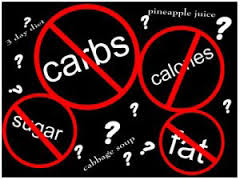 It seems like every few months a new diet hits the press promising fast weight loss, increased energy, and maybe even to fix all our health problems. As a Registered Dietitian, I have seen diets come and go over the years and the question that always enters my mind is, how long will this one be around?
It seems like every few months a new diet hits the press promising fast weight loss, increased energy, and maybe even to fix all our health problems. As a Registered Dietitian, I have seen diets come and go over the years and the question that always enters my mind is, how long will this one be around?
Many times the diets are just too hard to follow or stick with over time, so individuals lose weight but eventually go off the diet and gain it all back with more. Earlier this year, U.S News & World Report published the “Best Diets” (http://health.usnews.com/best-diet ) as rated by a team of impressive experts (http://health.usnews.com/best-diet/experts) including physicians, nutritionists, and psychologists. These experts looked at the following criteria: how easy it is to follow, its ability to produce short-term and long-term weight loss, its nutritional completeness, its safety and its potential for preventing and managing diabetes and heart disease. From this report, it appears most diets don’t work, at least long term. If you are considering following a popular diet, I recommend reviewing this report before you choose one.
The discouraging part of many of these diets is they do produce results, short term, but are very restrictive, and as individuals lose weight, they also lose lean body mass (muscle) – the very thing that maintains our metabolism, gives our body shape and provides energy and power. As the individuals regain the weight, it’s all fat and the muscle is long gone… unless they are planning to rebuild it through regular a strength training program.
This “yo-yo” process is especially problematic as we grow older because it speeds up the natural loss of lean body mass that occurs with aging, leading us to feel weaker and older than we really are. So, how can we stop the weight loss, fat gain cycle? Below are 6 tried and true strategies that have worked for me and many of my clients to increase energy, keep the muscle, lose fat and keep it off.
- Say “No” to Diets: Many diets are restrictive or eliminate foods that are considered healthy with supporting studies that show these foods contribute to healthy outcomes and decreased chronic disease. Some of these foods include whole grains, dairy, and fruits. Of course, if you have allergies it is best practice to avoid them.
- Eat a Balanced Diet: The best strategy is to eat a variety of foods in all food groups including lean meats, plant proteins such as peanut or almond butter, low-fat dairy, fresh fruits and vegetables, legumes, and nuts and seeds. Avoid or at least limit processed foods that contain added salt, sugar, and fat.
- Eat smaller portions: Bottom line, most individuals gain weight because they eat is more than they burn. Just cutting back is a great first step. I learned a valuable strategy from one of my clients called the “80-20” rule – eat to feel 80% full by decreasing your portion by 20%. Don’t even put it on your plate to avoid the temptation to eat it.
- Avoid the Hunger Beast: The Hunger Beast is stronger than any will power. When we allow ourselves to get too hungry, no will power can stand. Eating a substantial snack between meals will help stand strong against temptation. Examples may be a mini bagel with natural peanut or almond butter, Greek yogurt with nuts, or garbanzo beans with Italian dressing, these snacks work great to take the hunger away until the next meal, making it possible to be in control of your choices.
- Eat Carbs to Spare Muscle: So many diets want us to believe carbohydrates are the enemy, when they are actually what helps spare our muscle when dieting. Typically, when losing weight, we lose fat, water, and muscle. When we eat low carbs, our body uses our protein for energy instead of using it to rebuild and spare our muscle. The best strategy is to eat a minimum of 125 to 150 gms of carbohydrates per day. Carbs don’t make us fat, over eating does. Most extremely lean body builders’ diets consist of 50% carbs, 30% protein, and 20% fat. There are also studies showing no significant differences in weight loss when macronutrients (carbs, protein, and fat) percentages are adjusted between high protein/low carb to low fat/high carb. Overall studies show the primary contributing factor to weight loss is a calorie deficit.
- Pick a diet plan you can follow for life: No matter what diet you follow if you don’t like it or it is too hard to follow, it won’t work for you! Our brain needs to attach change with a positive to adhere to a diet. Otherwise, struggling will cause the brain to revert back to old habits. Therefore, gradually modify food choices and behaviors using the strategies above and move frequently to stay strong, energized, and healthy.
I would love to help you reach your goals and save you the frustration of following a diet to lose weight just to regain fat. ATP Fitness starting in September 2016 is focusing on “Eating for Energy” for the education theme. The group coaching following the exercise will review various diets, foods, and eating habits and their impact on weight, energy, and health. Learn more by contacting me at [email protected].










Leave a Reply